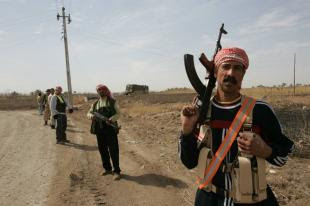 Early Thursday, less than two weeks before the president's Aug. 31 deadline for ending American combat operations in Iraq, the 4th Stryker Brigade, 2nd Infantry Division crossed the border from Iraq into Kuwait.
Early Thursday, less than two weeks before the president's Aug. 31 deadline for ending American combat operations in Iraq, the 4th Stryker Brigade, 2nd Infantry Division crossed the border from Iraq into Kuwait.
With the departure of this last combat brigade, the U.S. military presence in Iraq is now down to 50,000 troops, fewer than at any time since the 2003 invasion. The shift offers a useful moment to take stock of both how much has been accomplished and how much is left to be done in what is fast becoming our forgotten war.
1. As of this month, the United States no longer has combat troops in Iraq.

 War Glance
War Glance U.S. military leaders inherited a faulty strategy for the war in Afghanistan at the end of the Bush administration and are still working to “refine the concepts,” the U.S. commander said in an interview airing Sunday on NBC’s “Meet the Press.”
U.S. military leaders inherited a faulty strategy for the war in Afghanistan at the end of the Bush administration and are still working to “refine the concepts,” the U.S. commander said in an interview airing Sunday on NBC’s “Meet the Press.” As the last U.S. combat troops prepare to leave Iraq this month, the State Department is struggling to implement an expanded mission that it has belatedly realized it might not be able to afford.
As the last U.S. combat troops prepare to leave Iraq this month, the State Department is struggling to implement an expanded mission that it has belatedly realized it might not be able to afford. Anyone who thinks the United States is really going to withdraw from Afghanistan in July 2011 needs to come to this giant air base an hour away from Kabul. There’s construction everywhere. It’s exactly what you wouldn’t expect from a transient presence.
Anyone who thinks the United States is really going to withdraw from Afghanistan in July 2011 needs to come to this giant air base an hour away from Kabul. There’s construction everywhere. It’s exactly what you wouldn’t expect from a transient presence. Mr. Goldstein argues that it’s clear the counterinsurgency and population-protection policy, as set out in Gen. Stanley A. McChrystal’s manifesto last summer, is failing, reminiscent of the grandiose plans Mr. Bundy promulgated in Vietnam in the 1960s.
Mr. Goldstein argues that it’s clear the counterinsurgency and population-protection policy, as set out in Gen. Stanley A. McChrystal’s manifesto last summer, is failing, reminiscent of the grandiose plans Mr. Bundy promulgated in Vietnam in the 1960s. An internal Central Intelligence Agency (CIA) document released by WikiLeaks in March reveals a secret plan to use the plight of Afghan women and refugees in developing media strategies to "leverage French (and other European) guilt" during an especially bloody summer of military escalation. The confidential document was prepared by the Red Cell, a secretive group that consults the US intelligence community.
An internal Central Intelligence Agency (CIA) document released by WikiLeaks in March reveals a secret plan to use the plight of Afghan women and refugees in developing media strategies to "leverage French (and other European) guilt" during an especially bloody summer of military escalation. The confidential document was prepared by the Red Cell, a secretive group that consults the US intelligence community.






























